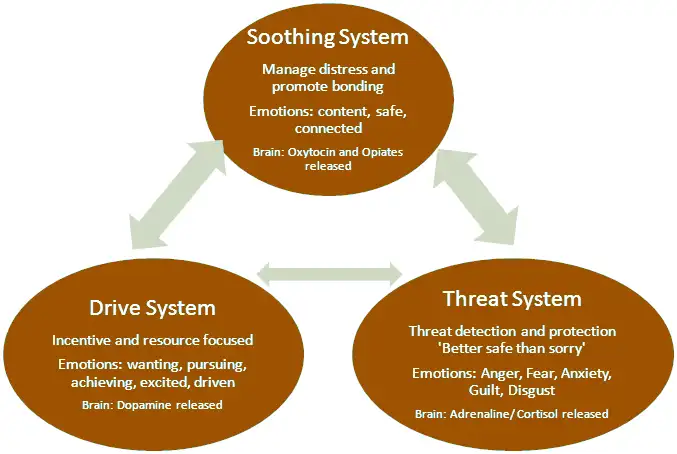Part 4: The Compassionate Container - Guidance and Space Holding in Psychedelic Therapy
In our journey through transpersonal psychology, we've explored its foundations, met its pioneers, and seen how psychedelics acted as a catalyst for the field. Now, we turn to one of the most crucial elements of any deep transformative work: the safe, supportive, and loving environment in which it happens. At Compassion Retreats, we call this the "compassionate container."
The Principles of Compassion-Focused Therapy (CFT)
Developed by psychologist Paul Gilbert, Compassion-Focused Therapy (CFT) is a powerful approach designed to help people who struggle with high levels of shame and self-criticism. It blends insights from evolution, neuroscience, and Buddhist philosophy.
CFT is based on a simple but profound idea about our "tricky brain." Our brains evolved with three main emotional systems:
- The Threat System: Designed for danger, it gives us feelings like anger, anxiety, and disgust to keep us safe.
- The Drive System: Motivates us to seek rewards and achieve goals, giving us feelings of excitement and pleasure.
- The Soothing System: Linked to caring and connection, this system is activated by warmth and kindness, making us feel calm, safe, and content.
For many of us, especially if we've experienced a lack of affection or trauma, our threat system can be overactive and our soothing system underdeveloped. This leads to a harsh inner critic and a lot of self-judgment. The goal of CFT is to correct this imbalance by actively training our soothing system through Compassionate Mind Training. This involves guided exercises to develop qualities like sensitivity to suffering, empathy, non-judgment, warmth, and the motivation to care for ourselves and others. It's about building an inner source of kindness to counteract the inner critic.

The Art and Science of Holding Space
"Holding space" is a term you might hear in therapeutic and healing circles. It's a conscious, intentional act of being fully present for another person's experience without trying to fix, manage, or judge them. It's about creating a safe container where someone feels free to be completely authentic.
This isn't a passive act. It requires active skills from the facilitator or therapist:
- Deep Listening: Listening only to understand, not to reply.
- Withholding Judgment: Resisting the urge to give advice or "fix" the problem.
- Creating Psychological Safety: Communicating acceptance and trust, validating all emotions.
- Maintaining Presence: Staying with the person's distress without becoming overwhelmed.
- Empathy: Feeling with the person and showing you understand.
At its heart, holding space is an act of profound trust in another's innate ability to navigate their own journey. The healing isn't in the advice given, but in the compassionate presence offered. This is the essence of the guidance we provide in our private retreats in Mexico.

The Synergy: Psychedelics, Compassion, and Presence
The principles of CFT and the practice of holding space come together with incredible power in psychedelic-assisted therapy. The psychedelic experience can create the ideal brain state for the wisdom of CFT to take root.
Substances like MDMA and psilocybin can temporarily quiet the brain's threat system (the amygdala), reducing fear and defensiveness. At the same time, they can boost activity in brain regions linked to empathy and social connection, effectively turning up the volume on the soothing system. This creates a unique "window of tolerance" where we can look at difficult memories or feelings without being overwhelmed.
This is where the MAPS MDMA-therapy protocol's concept of an "inner healing intelligence" comes in—an idea that resonates deeply with the transpersonal Higher Self. The belief is that we all have an innate capacity to heal; the psychedelic simply helps remove the barriers.
In this open and vulnerable state, the facilitator's role is not to "fix" but to hold a compassionate space for this inner healing intelligence to do its work. The therapist's non-judgmental, caring presence provides a powerful anchor. Feeling safely "held," a person is empowered to explore their inner world. They can learn, perhaps for the first time, to turn that same compassionate attention toward themselves.
The psychedelic journey, held within this container, becomes a powerful training ground for self-compassion. It's a modern ritual where the active ingredients are the synergy between the chemical catalyst and the profound experience of being safely and compassionately witnessed. This is the heart of the therapeutic model we practice at Compassion Retreats.
Sources for this article
- Compassion-focused therapy - Wikipedia
- self-compassion.org
- What is Holding Space? - Holding Space Foundation
- The Healing Power of Holding Space - Psychology Today
- The Art of Holding Space: A Practice of Love, Liberation, and Leadership
- Bringing MDMA-assisted therapy for PTSD to traditional healthcare systems...
- What Is the State of Compassion Education? A Systematic Review...
- The therapeutic alliance between study participants and intervention...






